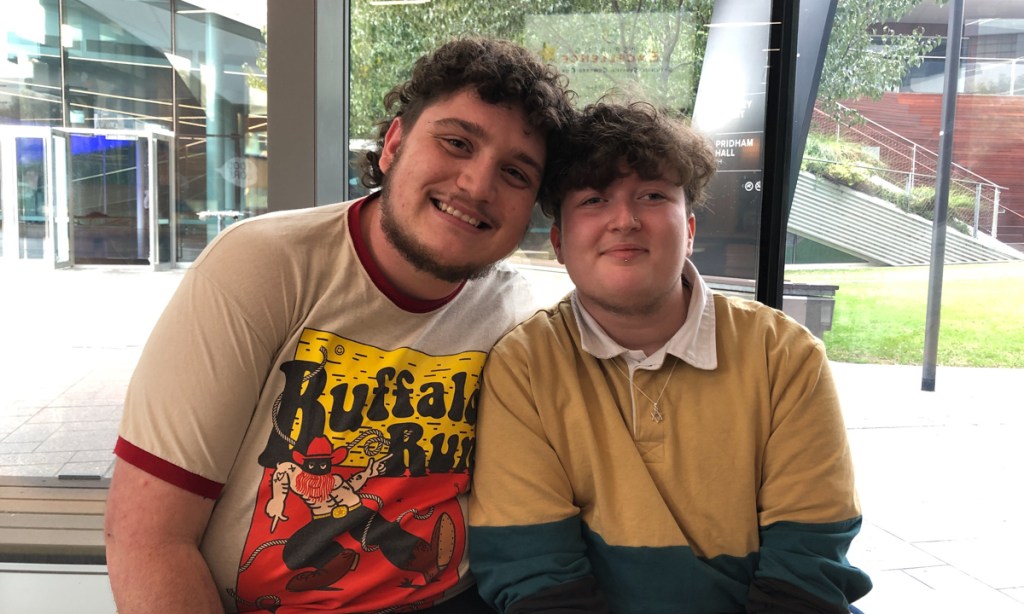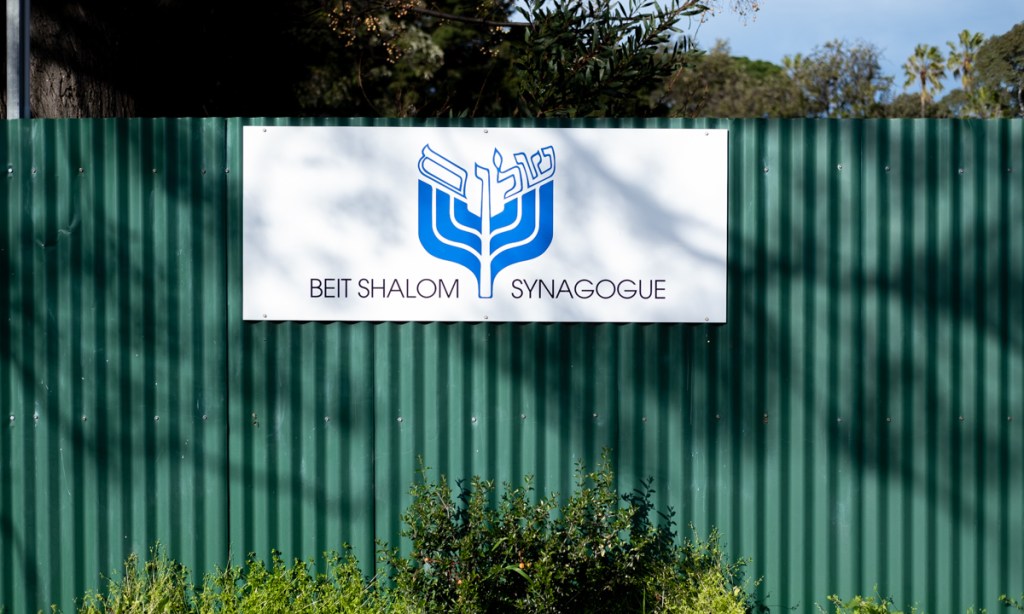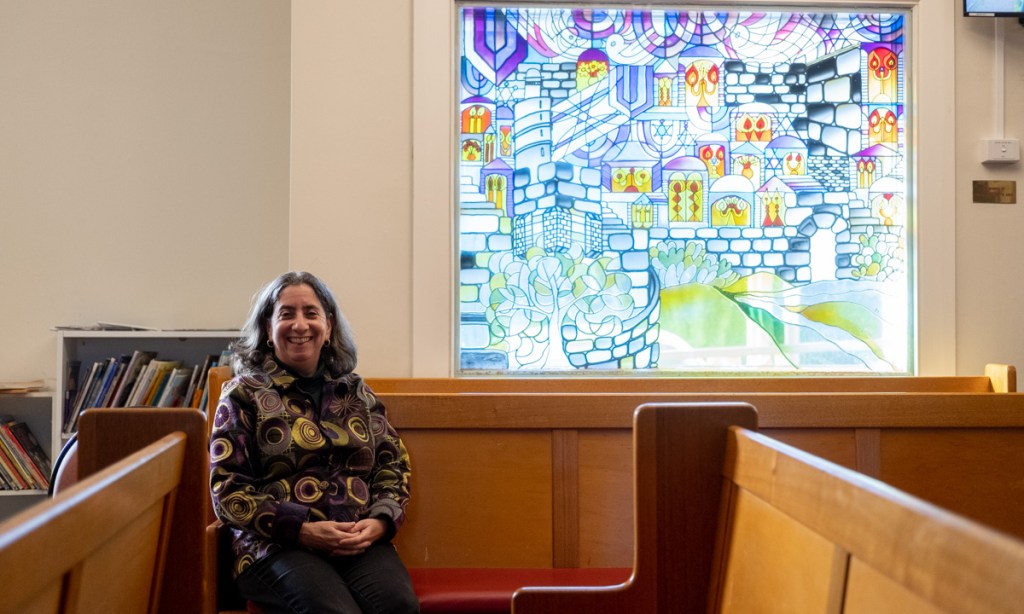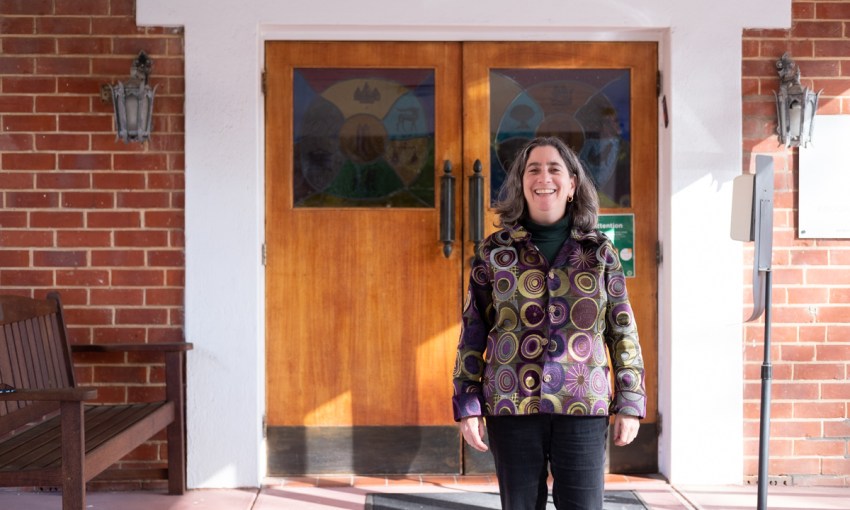Adelaide’s Beit Shalom Synagogue is proving a haven for some trans and nonbinary people seeking a religion of compassion. CityMag speaks to aspiring Jews by Choice Jace Reh and Theo Brown and the synagogue’s Rabbi Shoshana Kaminsky.
May the doors of this synagogue be wide enough
It’s easy to know when you’re in the presence of love.
When a couple starts completing each other’s sentences, or there’s a companionable silence between them when one of them trusts their partner is better at speaking to a particular issue. The joy evident in the way both admire how the other talks, simply because they’re partners.
Ron Hoenig is the Jewish co-chair of the SA Council of Christians and Jews and the chair of the Australian Council of Christians and Jews.
This is the way Jace Reh and Theo Brown speak in conversation with CityMag, their love evident in every moment. The two have also recently found something new to share: Judaism at Beit Shalom.
Beit Shalom’s Rabbi Shoshana Kaminsky says Jace and Theo are part of a worldwide trend of trans and non-binary people joining progressive synagogues in both western and formerly Eastern bloc countries. They are among a group of five LGBTQIA+ people in Beit Shalom’s conversion program who have found the synagogue and its style of Judaism a haven.
Gender dysphoria is the experience of knowing that you are in the wrong body. Although you were raised to be a female, that’s not really who you are. Jace and Theo both prefer the pronouns “he/they”, and are happy for people to use either one. In terms of gender, they both identify as transmasculine.
“I think my gender experience does kind of alter everything about my life – the way I lived as a female for the first 15 years of my life, which means that I will have certain opinions that will be different from someone who is cis-gender,” Jace says
Jace is large and stocky with a beard and Theo is smaller with a rounder face and he carries a cane. He has Ehlers-Danlos Syndrome (EDS) which is a group of inherited disorders that affect connective tissues —skin, joints and blood vessel walls. Among other things, it means his joints are loose and can easily dislocate. Theo is studying a Certificate 3 in Community Services and he wants to study a Bachelor of Disability and Community Inclusion at Flinders University online. Jace is doing a media and communications degree at UniSA and hopes to specialise in political communications.
“So when I first came out, I came out as a trans-man, so I identified as a man,” says Jace, who initially carries most of the conversation.
“I started socially identifying as a man when I was 16 and then I started medically transitioning when I was 18. That involves injecting a lot of hormones.
“It made me feel better in my body. It made me feel more comfortable to be who I am. It changed a lot of feelings about myself.”
For one thing, he feels safer at night.
“Does it feel better to go out at night when I look like a man? A hundred percent,” he says. “I will very rarely get clocked as anything other than just a man.”
Jace, who is also a Wotjobaluk and Gomeroi person, attended a public school in South Australia’s mid-north, and it wasn’t a positive experience. He was not bullied for gender issues, but because “we were poor”, he says.
Upon telling a school psychologist that he wanted to be Prime Minister of Australia, his ambition was promptly curtailed: “‘Your dad is a labourer and your mum was a teen mum, perhaps you ought to think again’,” Jace recalls being told.
Jace wanted to change schools, but the only other option in the area was a Christian Life Ministries school, which was not a positive experience for someone experiencing dysphoria. He says the tone of the school was “‘Do you want to burn in a fiery hell pit?’”
Because of these early experiences, Jace has come to understand that “queer people, we’re at risk in a lot of spaces”, he says. This has had the effect of him lowering the bar for what he considers acceptance.
“We go into [some] places and people do make a point of saying something rude to us, so if no one’s doing that, that’s enough. Sometimes you will [just] accept tolerance, and that’s enough,” he says. “Anytime I walk into a space, I’m always at risk of being targeted, but the synagogue hasn’t given us any reason to believe that.”
The couple have known each other for two years. Jace moved from Canberra to Adelaide in August 2022 and they met each other two weeks later, moving in together in January 2021.
There is a remarkable synergy between them. Jace is dyslexic, so Theo reads to him. Theo is encumbered by his disability but he’s “really good at words”, Jace says.

Jace and Theo
As for what brought them to the synagogue, “I guess it’s my fault,” says Theo.
Theo was born in Ireland, but came out to Australia at age three. When he was 12, the family went back to Dublin to visit his aunt Noeleen, who took him for a day of sightseeing. They ended up at Stratford College, a secondary school under the patronage of the Dublin Talmud Torah that accepts students “from all faiths and none”. “[Noeleen] told me about how she sent her oldest son, Cian, there,” Theo recalls.
Cian, like Theo, is gay and is on the autism spectrum. Theo says the rest of the schools in Ireland, both government and religious, at the time were Catholic and they were not very kind to Cian. But the Jewish school was. “So Noeleen kind of developed [a love for Judaism],” he says.
At lunch, Noeleen told Theo that Leonard Cohen had become her favourite musician. She also spoke about religion.
“She just talked about how she believed in God but she didn’t like how Catholicism dealt with her son, and Judaism gave her a sort of space where she could, by association, still believe in those things in a way that didn’t feel so cruel to her,” Theo says.
The way Noeleen explained her connection to the religion appealed to Theo. He has the same sort of feeling – he wanted to be religious, but he didn’t want to experience rejection because of his gender and sexuality.
He says he was looking for a religion where he felt comfortable. A religion, Jace adds, “where the values are aligned and something where you could be who you already were, but with that guidance of God because you already knew about gender identity and sexuality.”
Theo had looked into other religions to fulfil this desire, including Paganism, but decided he wanted to go to a shul. But this presented another problem. “I’m also autistic so I find it quite hard to have the confidence to start new things,” he says.
Jace says he believes in God, but he wasn’t initially as keen as Theo to find a religious haven.
“But Theo was, like, ‘I really want to do this but I’m afraid to leave the house, meet new people’, and I was, like, that’s fine,” Jace says.
‘LGBTIQA people’s right to be: views from the Abrahamic traditions’
7:30pm Thursday, 8 September
Effective Living Centre
More info
Hosted by the SA Council of Christians and Jews and the Effective Living Centre.
They decided to go together, catching public transport from the northern suburbs to the Hackney Road synagogue.
“I had a very angry view of Christianity,” Jace says, “so I was hesitant to even go to the shul, because I thought, I don’t need that stuff anymore.
“I believed in God, but so many of the things that they’d teach us (in churches) made me so sick to my stomach.
“The first day that we walked into the shul, it was beautiful. We felt so welcomed, we felt so appreciated.
“Everyone was really kind, really nice.”
After five or six months of “accompanying” Theo to Beit Shalom, Jace decided he, too, would convert. They’ve been in the conversion course for about a year and are now awaiting the beth din.
There are many queer people who want to maintain their religious identity without compromising their sense of self. In Jace’s experience, “Judaism is a conversation that has been thrust into queer spaces quite predominantly over the last couple of years”.

The view of the Beit Shalom from Hackney Road
Rabbi Kaminsky says there has been an overall increase in the number of people who want to convert to Judaism. The Rabbi speculates the 2020 experience of COVID and isolation allowed people to reflect on the role religion played in their lives, with some opting to give Judaism a shot. She says the American Jewish community is miles ahead of where we are in Australia, so the Union for Reform Judaism has been working very hard to build queer-friendly synagogues where people feel welcomed.
“I don’t think that we’ve necessarily even considered having that conversation yet in Australia,” Rabbi Kaminsky says
“In 2015, the Reform Jewish Movement led the religious community in affirming the rights of transgender and gender non-conforming people. The Movement stated that it ‘Affirms its commitment to the full equality, inclusion, and acceptance of people of all gender identities and gender expressions’.”
Despite this, trans and non-binary people face the same concerns as the broader community when becoming a Jew by choice – concerns about being judged, about being questioned. And unfortunately this can happen to anybody who chooses to be Jewish.
“It’s definitely been an area of growth, certainly, at Beit Shalom,” Rabbi Kaminsky says. But many synagogues don’t know what to make of this influx. She says she would like to believe progressive synagogues are more accepting of queer people.

Rabbi Shoshana Kaminsky
This is a topic Jace and Theo talk about all the time among their queer peers.
“There’s a really anti-theistic sentiment in queer spaces, and to be able to combat that, a lot of people have brought up Judaism as, like, a statement that not all religions are like Christianity,” Jace says.
The perspective that Jace and Theo see in their community is a general assumption that all religions are anti-LGBTQIA+. In the media, queerness and religiosity are often portrayed as at odds with one another.
Jace says attitudes towards LGBTIQA+ people differ broadly across, and even within, all faiths and denominations.
“When you say all religious people hate gay people, you mean just some… and I guess Judaism was one of those,” he says.
But attitudes within the Jewish faith are as diverse as the numbers of streams of Judaism, as Jace and Theo have discovered.
“A lot of people haven’t been able to find a shul that fits them. We see a lot of people online that are attempting to convert to Judaism and then not liking it as soon as they get in there,” Jace says.
Rabbi Kaminsky says Jace and Theo are appreciated in the community because they volunteer, they help out, and they’re very generous with their time. They’re equally happy to be within the walls of the synagogue.
“We like all the traditions, we like all the values, so even if we didn’t find a shul that’s exactly what we want, we will accept it,” Jace says.
Because of COVID there is only a very small number of the congregation who are attending services regularly. Because of this, anytime there’s a large influx of new people, Rabbi Kaminsky says “there’s a concern that the synagogue is going to turn into something different, and it’s going to lose that sense of familiarity”. The Rabbi says there was a similar concern 10 years ago, following an influx of middle-aged single women coming to the conversion group.
“I’ve been pushed to grow by the people I have been exposed to and if one of the things we need to do in our lives is to grow and change, then I’m seeking to grow and change,” she says.




